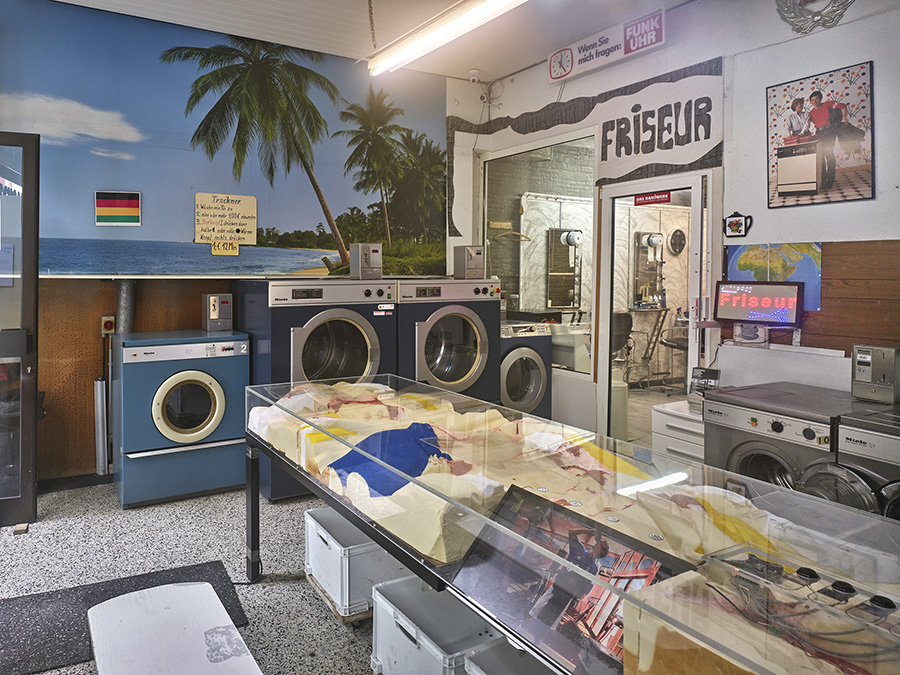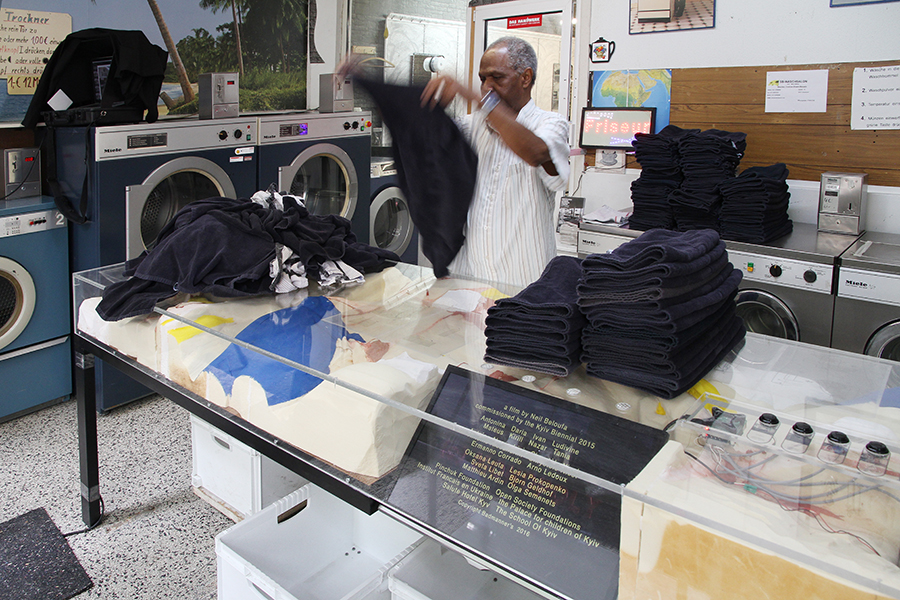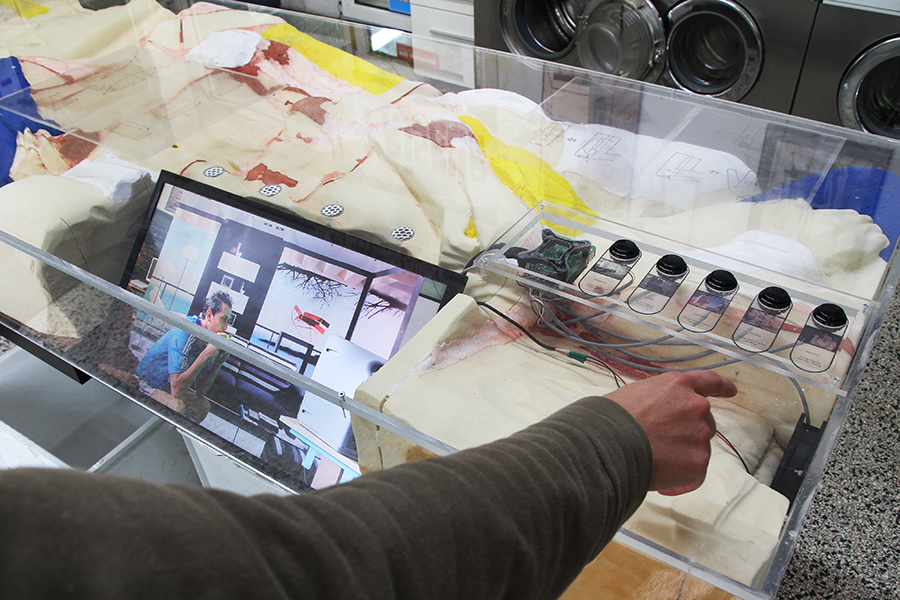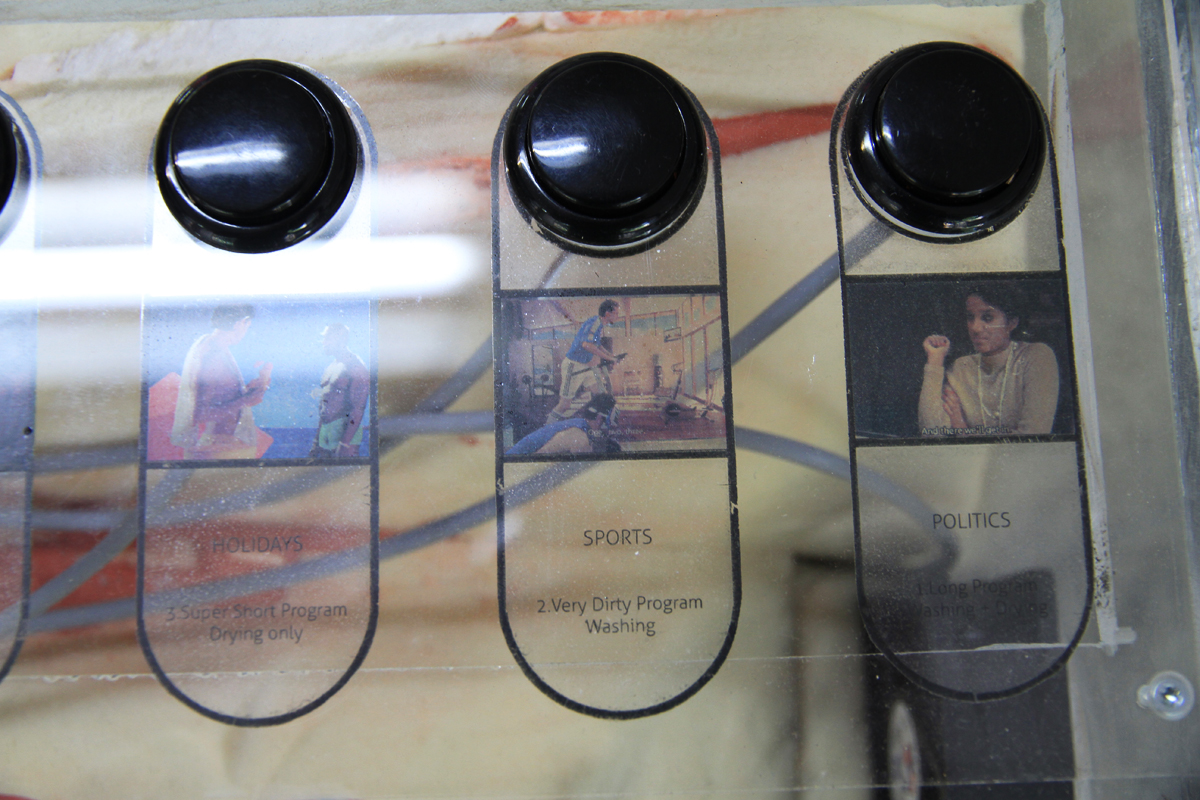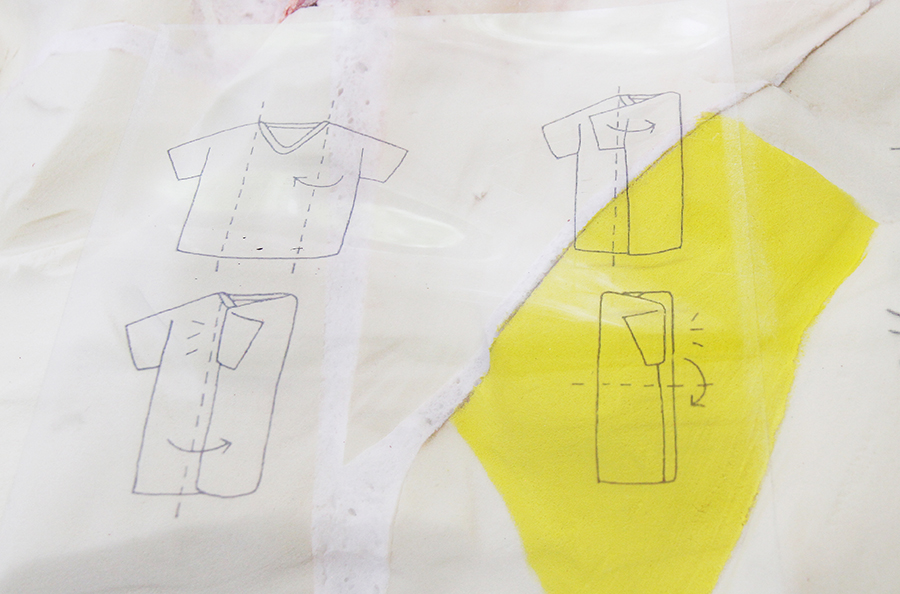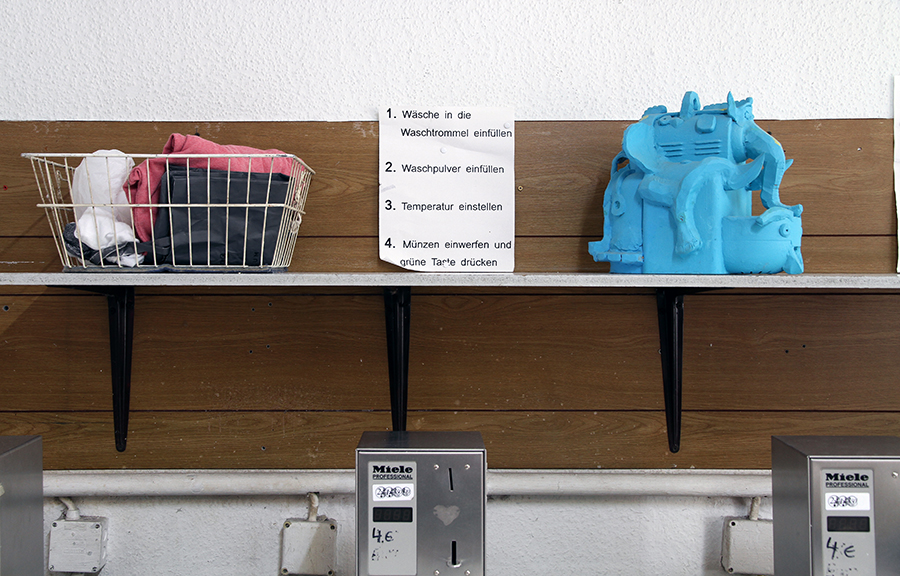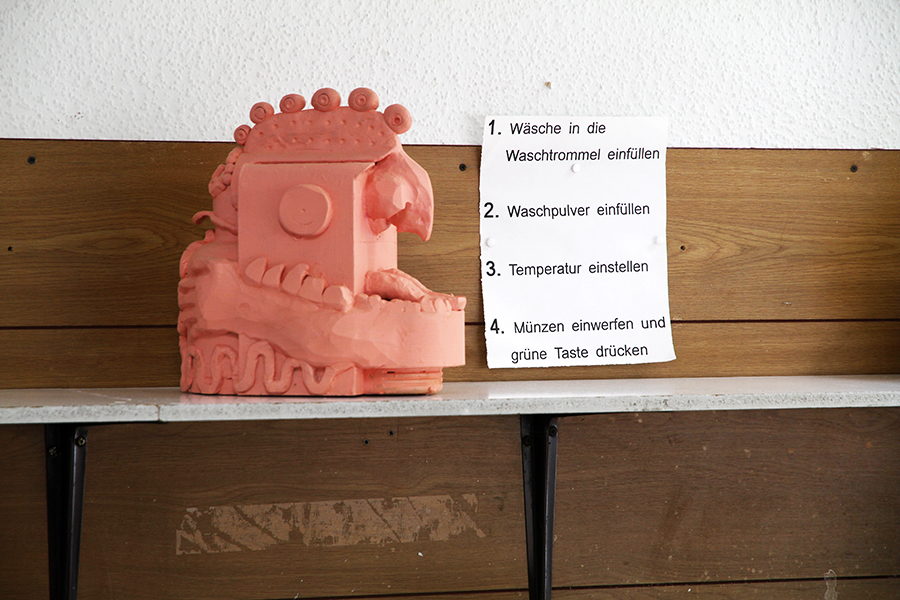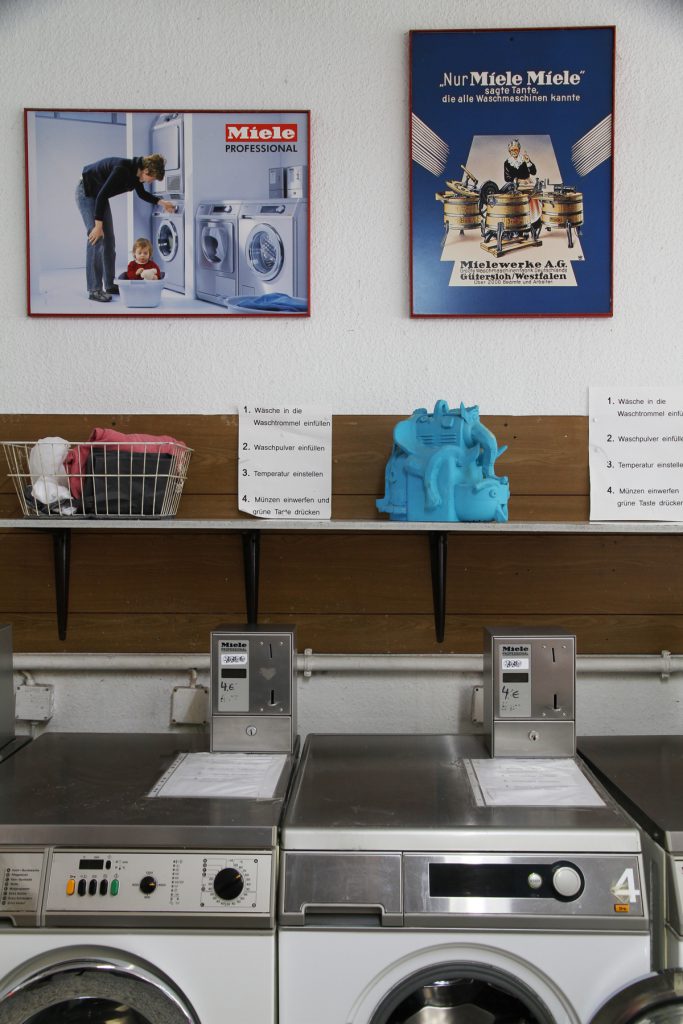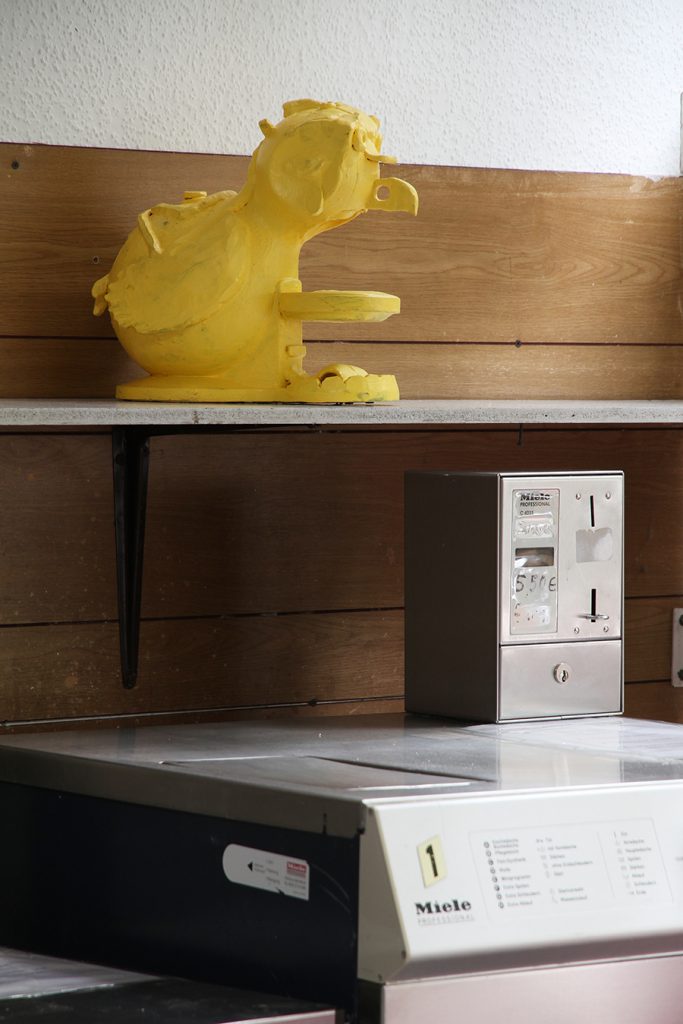
Neïl Beloufa
Der Waschsalon von Momodou Jallow in der Düsseldorfer Querstraße ist eine Besonderheit. Die Ausstattung wirkt wie ein Überbleibsel aus vergangenen Zeiten: Alte Miele-Maschinen stehen zum Waschen bereit, Werbeplakate aus verschiedenen Jahrzehnten und Bilder historischer Waschgeräte zieren die Wände. Die Preislisten und Benutzungsanweisungen sind von Hand auf Pappschilder geschrieben. Eine Fototapete mit Traumstrand und eine selbst gestaltete Fahne – eine Kombination aus deutscher und ghanaischer Flagge – verweisen auf die beiden Heimaten des Besitzers. Dominiert wird der kleine Raum von einem Tisch zum Wäsche falten, den der Künstler Neil Beloufa als Herzstück des Salons identifiziert und für den Zeitraum der Ausstellung durch ein von ihm kreiertes nutzbares Objekt ausgetauscht hat.
Seine Installation ist eine Kombination aus funktionalem Möbelstück, Skulptur und Video-Jukebox. Die Vitrine aus transparentem Plexiglas hat exakt die Maße des ersetzten Falttischs. Gefüllt ist sie mit skulpturalen aus Hartschaumstoff geschnittenen Objekten. Deren Oberfläche gleicht einer Landschaft aus verschiedenen, teilweise gegenständlichen, roh geschnitzten Formen. Sie stellen mal mehr, mal weniger deutlich einzelne menschliche Körperteile dar: Hände, ein weiblicher Torso, ein Hinterteil in Bluejeans sind auszumachen. Das Beige des Materials wird durch einzelne Farbsetzungen unterbrochen. Während mit Gelb, Blau und Weiß klar abgegrenzte Flächen markiert sind und dem Betrachter so einen Anhaltspunkt zur Interpretation der sonst nur angedeuteten Formen geben, verteilt sich die rote Farbe in verschiedenen Schattierungen punktuell und unkonturiert über die gesamte Fläche.
Auf der Tischoberfläche befinden sich gezeichnete Anleitungen zum Falten von Hosen, Hemden und T-Shirts. Die Zeichnungen entstammen dem aktuell populären Bestseller der Lebensratgeberin Marie Kondō, Magic Cleaning – Wie richtiges Aufräumen Ihr Leben verändert. Kondō verspricht darin Seelenheil durch die richtige Aufräumstrategie. Sie hat es verstanden, aus der gesellschaftlich offenbar stark verankerten Sehnsucht nach einer geordneten Welt ein florierendes Geschäft zu machen – das sieben Millionen Mal verkaufte Buch, eine Netflix-Serie und Aufräum-Consultants gehören zu ihrem Ordnungs-Imperium.
Ähnlich neoliberale Sehnsüchte nach Effizienz und Optimierung legt der Künstler in seinen Filmen frei, die auf einem an der rechten Ecke der Installation eingelassenen Bildschirm zu sehen sind. Über fünf Knöpfe können Salonbesucher beim Warten auf ihre Wäsche zum jeweiligen Waschgang passende Videos wählen. Die fünf Filme sind mit den Themen Housing, Games, Holidays, Sports und Politics betitelt, die – entsprechend ihrer Länge – einem Schnellwaschgang, dem Eco- oder dem Waschprogramm für sehr dreckige Wäsche zugeordnet sind.
Die Filme entstammen dem Repertoire des Künstlers aus den Jahren 2012 bis 2014. Sie sind allesamt stark überzeichnete Beobachtungen einer Gesellschaft, die sich selbstreflexiv um ein bequemes, optimiertes, funktionales Leben bemüht, ohne dabei dessen groteske Auswüchse zu bemerken. Zu dieser Welt bilden sowohl Beloufas Installation mit ihrer einnehmenden, aber schwer zu interpretierenden kruden Ausstattung als auch der Ort selbst – der Waschsalon als Symbol für unproduktive Zeit – einen Konterpunkt mit Platz für das Absurde, Ambivalente und Verspielte.
Exclusiv
Momodou Jallow’s laundromat in Düsseldorf’s Querstraße is unique. The facilities look like remnants of an earlier time: old Miele washing machines are on standby, while advertising posters from earlier decades and pictures of historical washing machines adorn the walls. Price lists and operating instructions are written out by hand on cardboard signs. The photo-image wallpaper depicting a beach paradise and a self-designed flag—a combination of the German and Ghanaian flags—refers to the owner’s two homelands. The small room is dominated by a table on which to fold laundry, and it is this that the artist Neil Beloufa identified as the heart of the laundromat, and which, for the duration of the exhibition, he exchanged for a usable object that he himself created.
Beloufa’s installation is a combination of functional furniture, sculpture, and a video jukebox. The display case made of transparent Plexiglas has exactly the same dimensions as the folding table it has replaced. It is filled with crude sculptural objects cut out of rigid foam: a surface that resembles a landscape of various, sometimes representational, roughly carved forms. The objects represent—to varying degrees of clarity—individual human body parts: hands, a female torso, and a bottom in blue jeans are discernible. The solid beige of the material is punctuated by coloring. While the yellow, blue, and white colors mark out clearly delimited areas and thus give the viewer a guide to the interpretation of the forms that are otherwise only hinted at, the red color is spread over the entire surface in different shades, and in a piecemeal and non-contoured way.
Placed on the surface of the table are visual instructions for folding trousers, shirts, and T-shirts. The drawings come from the popular bestselling book by the lifestyle consultant Marie Kondō, The Life-Changing Magic of Tidying Up. Kondō promises salvation through the right tidying strategy and she has managed to turn society’s evidently deep-seated desire for an orderly world into a flourishing business; the book, which has sold seven million copies, and resulted in a Netflix series and “tidying consultants,” are all part of her tidiness empire.
The artist reveals similar neoliberal longings for efficiency and optimization in his films, which can be viewed on a screen placed in the right corner of the installation. Five buttons allow visitors to choose the right video for each washing cycle while they wait for their laundry. Topics such as Housing, Games, Holidays, Sports, and Politics also provide the titles for the five films, which are assigned to the quick wash, ecowash, or wash cycle for very dirty laundry, according to their length.
The films come from the artist’s repertoire from 2012 to 2014. They are all strongly exaggerated observations of a society that is self-reflexively striving for a comfortable, optimized, functional way of life, without noticing its grotesque excesses. Beloufa’s installation, with its engaging, yet hard-to-interpret crude features, as well as the place itself—the laundromat as a symbol of unproductive time—form a counterpoint to this world, with room for the absurd, the ambivalent, and the playful.



